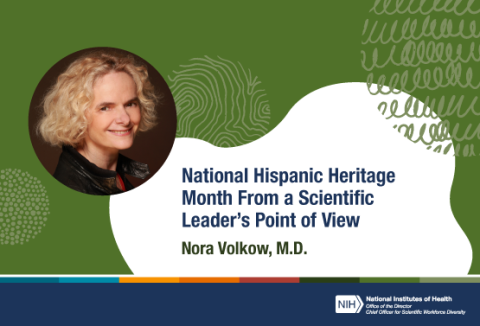This year, some of our COSWD blog posts have highlighted NIH scientific leaders from diverse backgrounds to demonstrate the variety of perspectives that are brought to bear in NIH policy and practice. This blog, as with other posts featuring NIH leaders, represents the authentic responses of the interviewee. We hope that you will enjoy the insights into Dr. Volkow’s thoughts and experiences and appreciate that “great minds think differently.”

Photo of Nora D. Volkow, M.D., Director, National Institute on Drug Abuse (NIDA). Credit: NIDA
First and foremost, Nora D. Volkow, M.D., is a scientist. But she’s also a woman who self identifies as Latinx. As the Director of the National Institute on Drug Abuse (NIDA), Dr. Volkow has spoken all over the world about the complexity of brain research and addiction and the need for diverse perspectives.
As we celebrate National Hispanic Heritage Month at NIH, I’m glad to share Dr. Volkow’s thoughts on her background and culture and how they intersect with science.
“For me, this month provides a time to recognize how we can be enriched by having the Hispanic and Latinx perspective embedded into the science operation,” Dr. Volkow said. “This includes not only diversity in ways of looking at science and developing it, but how we interact with one another. Latinos and Hispanics tend to be more socially driven and group oriented. When that dynamic starts to get immersed into the research, I think we can benefit because science is basically an activity of groups, and you rely on group interactions.”
Leaders Have an Obligation
When Dr. Volkow started working at a national lab in the United States in the 1980s, few women and immigrants were in her field. “I absolutely suffered from open, blatant discrimination because I was coming from Mexico,” she said.
Yet, she found a way to flourish.
“Rejection challenges me and pushes me to excel," she explained. “I countered discriminatory attitudes by showing that I could do as good or better work than others.”
But Dr. Volkow recognizes that not everyone can thrive under these circumstances and that there can be cultural-related challenges.
“There is an aspect in a lot of the Hispanics and Latinx culture that there is a differentiation between men and women and a structural system that has exacerbated it even more. There's even this term ‘machismo,’ which is macho man," she explained. "You have women that may come from families who have been influenced by this cultural upbringing, so we try to break the stigma. Hopefully, the gap is decreasing, but it's clearly still there.”
Dr. Volkow sees a critical role for leaders.
“Those of us in leadership positions have a responsibility to intervene and do what we can to help. You need to generate role models that can empower women and minorities in science and build their confidence,” she said. “We can facilitate connections.”
Real Benefits
One example of how diverse cultural perspectives improve science is NIDA's Adolescent Brain Cognitive Development℠ (ABCD) Study, a landmark study of adolescent brain development.
“The need for in-depth characterization of socioeconomic determinants was driven by the representation of Hispanic and Latinx investigators as well as other underrepresented groups,” she said. “Many of them were sensitized to these issues because of where they grew up.”
Dr. Volkow further elaborated. “I come from a country where there is tremendous poverty. When I was in medical school and doing rotations through the hospital, there were clear differences in the care that people got when they were poor and the conditions and diseases that they were suffering from, and the injustice.”
These differences can have long-term consequences. As Dr. Volkow said, “The ABCD study takes into consideration how adverse environments, social determinants of health influence the human brain, brain development, and behaviors. We’re working to open the door to understanding how these determinants influence health later in life.”
Multiple Perspectives
Multiple perspectives improve science. As Dr. Volkow said, “This makes the science much more interesting. One of the major goals that we aim to do in whichever scientific projects we're working with is to look at the complexity. As we study the brain, there are no two ways around it, we need to study complexity.”
Complexity requires multiple perspectives.
“Beyond AI and other emerging tools creating new opportunities, tapping into human experiences opens avenues for exploring complexity in many areas of science. The diverse perspectives that someone brings to the table can influence the way that they interpret that data or the way that they would even pose a problem,” Dr. Volkow said. “It’s important that NIH recognizes this, and there are many programs that have been built to facilitate the success of minority scientists."
I couldn’t agree more, and my office is proud to lead, produce, coordinate, and contribute to many of these programs. I hope you’ll visit our website, consider subscribing to our newsletter, and attend our next seminar in the fall. I promise it will be interesting!

